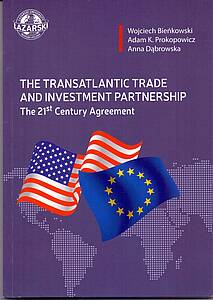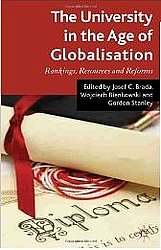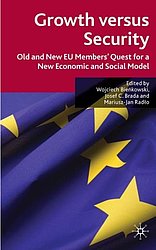
The Transatlantic Trade and Investment Partnership, The 21st Century Agreement
Wojciech Bieńkowski (Chapter 3), Adam K. Prokopowicz (Chapters 1,2,4,5,6), Anna Dąbrowska (Chapter 2).
Publisher: Lazarski University Pres, 2015
This book provides a comprehensive overview of the negotiating process for The Transatlantic Trade and Investment Partnership. It provides an interesting input to understanding the process of negotiations and a possible impact of this agreement. It provides background information, identifies negotiating entities and their procedures, defines negotiating mandates and scope of negotiations. Special attention is devoted differences in negotiation approaches between the United States and the European Union. A detailed description of areas of cooperation which were discussed and considered for the agreement is provided and assessed. The relationship between national law and provisions of this international agreement has been presented. Various approaches to economic benefits from the proposed agreement have been presented. Although finally, the agreement has not been signed, the negotiating process analysed in this book provided significant input to strategies for further development of transatlantic economic relationships. Some observations and conclusions presented in the book may also be applied in negotiating other agreements.
Book sold out.

The University in the Age of Globalization: Rankings, Resources and Reforms
Editors: Wojciech Bienkowski, Josef C. Brada, Gordon Stanley
Publisher: Palgrave Macmillan, 2012
This book brings together the views of an international group of experts on the internationalization of higher education, covering such themes as the international rankings of universities, issues of funding and autonomy, and the improvements needed in the promotion and commercialization of university research. Particular attention is paid to the system of higher education in the United States of America, and their domination of the top rankings. These universities and their experiences are compared to the higher education systems in the transition economies of Eastern Europe, which serve as an example of the problems facing middle income countries in terms of funding, the social and economic consequences of low rankings, and possible avenues of reform.
To order this book, click here.

Growth versus Security: Old and New EU Members' Quest for a New Economic and Social Model
Editors: Wojciech Bienkowski, Josef C. Brada, Mariusz-Jan Radlo
Publisher: Palgrave Macmillan, 2008
European Union member states have always sought to share a common vision of an economic and social model that would be a blueprint for all states to follow, and one that would make Europe both prosperous and different from other parts of the world. For many European countries this blueprint has traditionally been the European Social Model. This is a system based on a high level of social protection, social dialogue and public services to cover activities vital for social cohesion. Economic and political developments since the 1990s have made the blueprint less clear and attractive.
The crisis in the Western European welfare state and the economic reforms stemming from this crisis have led to changes in the economic and social models of the EU member states, giving rise to a debate on the viability of the European Social Model. This issue has become increasingly complex and dynamic following successive eastern enlargements of the Union.
This book examines whether the recent economic, social and political developments in the European Union and its member states require the Union to revise its belief that Europe can effectively compete with the United States and the emerging economies. This volume brings together a wide range of policy experts from both old and new European Union member states, as well as from the United States, and presents their insights, observations and research on this key issue. This book is an essential companion for all interested in the debate surrounding the future of economic and social models in Europe.
To order this book, click here.

Wzrost Gospodarczy Czy Bezpieczeństwo Socjalne?
(Economic Growth Or Social Security?)
Editors: Wojciech Bienkowski, Mariusz-Jan Radlo
Publisher: Polish Scientific Publishers PWN / Wydawnictwo Naukowe PWN
The book summarizes an exchange of views of prominent scholars and practitioners on the future of European economic and social models and their competitiveness in the conditions of global economy and the enlargement of the Union by several new CEE members. It contains articles discuss options for the socio-economic models of EU functioning after the enlargement. The authors also address the mounting difficulties and problems that have to be resolved by the new member-states to stimulate their and EU’s economic progress.
Among the authors are:
- Edmund S. Phelps - 2006 Nobel Prize laureate in economics;
- Walter D. Connor - Professor at Boston University and Harvard University;
- Stanisław Gomułka - Professor of economics at the London School of Economics;
- Dr. Jacek Rostowski – former Minister of Finance of Poland;
- Karel Dyba - former Minister of Economic Policy and Development and former Minister of Economy of the Czech Republic;
- Ivan Mikloš - former Minister of Finance of Slovakia and co-author of the Slovak radical economic reform;
- Lajos Bokros - former Minister of Finance of Hungary;
- Karl Aiginger - Director of the Austrian Institute of Economic Research;
- Filip Keereman - Head of Unit at the Directorate-General for Economy and Finance of the European Commission.

REAGANOMICS GOES GLOBAL: What Can the EU, Russsia and Other Transition Countries Learn from the USA?
Editors: Wojciech Bienkowski, Josef C. Brada, Mariusz-Jan Radlo
Publishers: Palgrave Macmillan, 2006
This book contains a set of exceptional voices in the debate over the relative merits of the US and alternative European models of capitalism. The debate has come to the fore due to the slowdown in the deepening of European integration, Europe's poor economic performance and the need of the transition economies to find an economic model that will allow them to catch up with the rest of Europe. In this perspective, the authors of this volume examine how the lessons of "Reaganomics" serve as valuable guideposts.
One of the key theses presented in the volume, states that the American model is very much a product created in Europe, but Europe, which has usually tended to deliver good ideas conducive to economic prosperity, often failed to trust them sufficiently to make effective use of them. Therefore it is argued, that returning to the older European ideas of Locke, Montesquieu and Smith, as demonstrated by US economic performance over 200 years and especially since Reagan's reaffirmation of it, is the best way for Continental Europe, the post-communist, and other, countries desiring to stay competitive in a globalizing world.
To order this book, click here.

